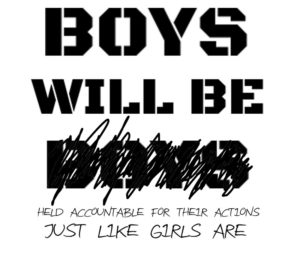 In my newsfeed recently I have seen articles on both sides about Trump’s comments to Billy Bush on the Access Hollywood bus. Some have been brave and well spoken, and others, well they’ve suggested that that’s just how men talk when women aren’t around and how it’s not a big deal. It’s just locker room talk. Men will be men.
In my newsfeed recently I have seen articles on both sides about Trump’s comments to Billy Bush on the Access Hollywood bus. Some have been brave and well spoken, and others, well they’ve suggested that that’s just how men talk when women aren’t around and how it’s not a big deal. It’s just locker room talk. Men will be men.
I am not writing about the issue of Trump discussing sexual assault directly, because others have written my thoughts more eloquently than I could, but I am interested in expectations and how we got here. Because to me, “boys will be boys” is where that conversation starts. ‘Boys will be boys’ grows into ‘men will be men.’
I will acknowledge that, with most things, there is a continuum to this, but let me just say I’ve never heard “boys will be boys” used to describe a male child helping his family clean up after dinner or doing his homework. I instead hear it used when a male child disobeys, plays rough, or acts out in class. Which translates to me as an oblique way of saying, “this child has a tendency toward disobedience, and we’ve not figured out how (or have stopped trying) to discipline him for it.” So in many ways they are words of defeat or a cry for help. Because the thing is, don’t all children have a tendency to disobey to some degree to another?
Now granted, I was that child where you could say, “I’m disappointed in you” and I would feel guilty for days. I understand all children are different, but I’m suggesting that what shouldn’t differ from male children to female children is our expectations for them to live within healthy boundaries. It’s again about expectations.
You see, research into expectations shows some really interesting things. Our expectations about a child actually effect that child’s actions. Research in the 1970s led by Ray Rist showed that teachers expectations of their pupils, from past reports, meeting their parents, how they dressed, but not any test of their academic performance, affected how well they thought those students would do in school. Which in turn affected how they interacted with those students. In summary, teachers’ created a self-fulfilling prophecy, and the students they thought wouldn’t do well, regardless of intelligence, didn’t do as well.
Studies of expectations have even been shown to have an effect on rats. A man named Robert Rosenthal did a study where he went into his lab and labeled some cages of rats as ‘smart rats’ and some as ‘dumb rats.’ In fact, they were all just rats. Then his students ran their rats through mazes and tasks. The results seemed almost crazy in that the “smart” rats did almost twice as well as the “dumb” rats, even though they were all just rats. It turned out that the students’ expectations affected how they interacted with the rats in all sorts of small ways. They touched the rat more gently, felt more warmly toward the rat, and in turn, the rat preformed better.
Now I’m not trying to compare children to lab rats. I just think that this study does a fantastic job of pointing out how our expectations come through in small, almost unperceivable actions, and how those actions in turn shape our overall behavior.
So, back to boys being boys. There are behaviors that society has come to expect from boys as ‘natural’ without thinking about how we as parents, caregivers, teachers, etc. might be reinforcing said behavior. If, when a girl pushes another child she is disciplined, but when a little boy pushes another child it gets shrugged off as just being a boy, we are reinforcing that stereotype. When we tell little girls “he’s being mean to you because he likes you” we’re perpetuating that problem. This is undervaluing how boys can behave with boundaries and good discipline. If our expectations can shape our interactions with children, then I would hope that our expectations would be setting up both boy and girl children for success, problem solving skills, understanding good boundaries, and accountability for their actions.
Because we have had too many examples of what it looks like when men (and by men I mean mostly white men, particularly rich and/or athletic white men) grow up having their behavior excused. Just this year we saw Brock Turner, Ryan Lochte, and now Trump get special treatment or have excuses made on their behalf for abhorrent behavior. Some might suggest that they are the exception to the rule, and I hope and believe so, but seeing people excuse Trump’s comments has made me nauseated this week.
So here’s the thing – it matters how we talk to little boys and what we expect of them. It matters that their disobedience is not shrugged off at a young age. It matters how we teach our young men to treat women and that we talk to them about consent and respect and taking responsibility for their own actions. It matters that we stand up to men in positions of power and privilege and those who protect them. It matters that we not say, “boys will be boys” or “men will be men.” Our words, our actions or lack of actions, in the care and raising of boy children play a part in where we are today. Our children deserve that we raise our expectations.
Start now, start with whoever is around you. Don’t let ‘boys will be boys’ grow into ‘men will be men.’

2 comments for “‘Boys Will Be Boys’ Leads to ‘Men will be Men’”